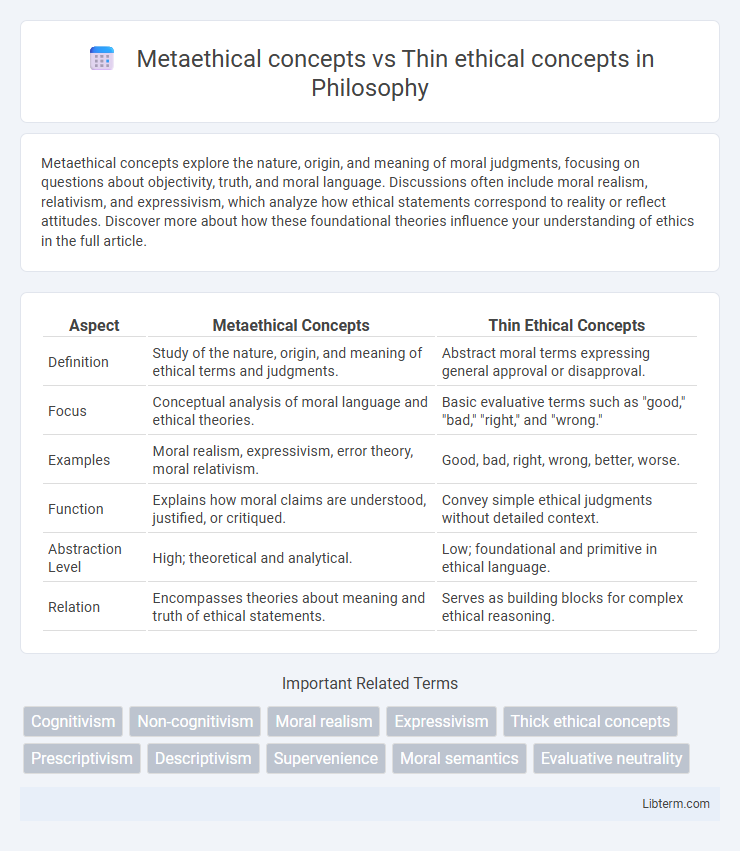Metaethical concepts explore the nature, origin, and meaning of moral judgments, focusing on questions about objectivity, truth, and moral language. Discussions often include moral realism, relativism, and expressivism, which analyze how ethical statements correspond to reality or reflect attitudes. Discover more about how these foundational theories influence your understanding of ethics in the full article.
Table of Comparison
| Aspect | Metaethical Concepts | Thin Ethical Concepts |
|---|---|---|
| Definition | Study of the nature, origin, and meaning of ethical terms and judgments. | Abstract moral terms expressing general approval or disapproval. |
| Focus | Conceptual analysis of moral language and ethical theories. | Basic evaluative terms such as "good," "bad," "right," and "wrong." |
| Examples | Moral realism, expressivism, error theory, moral relativism. | Good, bad, right, wrong, better, worse. |
| Function | Explains how moral claims are understood, justified, or critiqued. | Convey simple ethical judgments without detailed context. |
| Abstraction Level | High; theoretical and analytical. | Low; foundational and primitive in ethical language. |
| Relation | Encompasses theories about meaning and truth of ethical statements. | Serves as building blocks for complex ethical reasoning. |
Defining Metaethical Concepts
Metaethical concepts explore the nature, origins, and meaning of moral judgments, addressing questions about objectivity, truth, and the metaphysical status of ethical statements. Defining metaethical concepts involves analyzing terms like moral realism, subjectivism, and expressivism to understand whether moral claims reflect objective facts or subjective attitudes. These concepts serve as foundational inquiries contrasting with thin ethical concepts, which are directly evaluative terms such as "good" or "wrong," focusing more on practical moral evaluation than on the underlying nature of ethics.
Understanding Thin Ethical Concepts
Thin ethical concepts, such as "right," "wrong," "good," and "bad," primarily express evaluative judgments without conveying detailed descriptive content, distinguishing them from rich ethical concepts that embed more substantial moral information. Understanding thin ethical concepts is crucial in metaethics because they function as fundamental building blocks in moral language, facilitating analysis of ethical statements' logical structure and evaluative force. These concepts enable philosophers to dissect moral discourse, clarifying how evaluative terms operate independently of specific cultural, emotional, or contextual factors.
Key Differences Between Metaethical and Thin Ethical Concepts
Metaethical concepts analyze the nature, origin, and meaning of moral judgments, focusing on questions about objectivity, truth, and justification within ethics. Thin ethical concepts, such as "good" or "wrong," are fundamental evaluative terms that express minimal normative content and are commonly used to make straightforward moral assessments. The key difference lies in metafethical concepts examining the foundation and semantics of moral language, whereas thin ethical concepts serve as simple evaluative tools embedded directly in ethical discourse.
Historical Development of Metaethics
The historical development of metaethics traces back to ancient philosophers like Plato and Aristotle, who explored the nature of moral values beyond prescriptive actions. Metaethical concepts delve into questions about the existence, meaning, and objectivity of moral properties, contrasting with thin ethical concepts that focus on specific moral judgments or descriptors. Key figures such as G.E. Moore and David Hume further shaped metaethics by challenging moral realism and introducing non-cognitive theories during the 20th century, influencing contemporary discussions on moral language and ontology.
Origins and Uses of Thin Ethical Terms
Thin ethical concepts, such as "good" and "bad," originate from fundamental human experiences and social interactions, serving as basic evaluative terms. These concepts are versatile and widely used in everyday moral discourse to express approval, disapproval, or normative judgment without deep philosophical analysis. Metaethical concepts, in contrast, investigate the nature, origin, and meaning of these thin terms, exploring whether their reference is objective, subjective, or emotive within moral theory.
Role of Metaethics in Ethical Theory
Metaethical concepts analyze the nature, origin, and meaning of ethical terms and judgments, providing a foundational framework for understanding moral language and thought. Thin ethical concepts, such as "good" or "right," express basic evaluative meanings without revealing deeper justification or motivation. The role of metaethics in ethical theory is to clarify these underlying semantic and epistemological issues, enabling more precise and coherent moral reasoning by distinguishing between descriptive and normative aspects of ethics.
Common Examples of Thin Ethical Concepts
Common examples of thin ethical concepts include terms like "good," "bad," "right," and "wrong," which express basic evaluative judgments without detailed explanation. These concepts communicate fundamental ethical assessments that are widely understood across different moral frameworks. Thin ethical concepts differ from metaethical concepts, which analyze the nature, origin, and meaning of ethical language rather than making direct moral evaluations.
Interactions Between Metaethical and Thin Ethical Frameworks
Metaethical concepts address the fundamental nature, origin, and meaning of moral terms, while thin ethical concepts such as "good," "bad," and "right" express evaluative judgments with minimal descriptive content. Interactions between metaethical and thin ethical frameworks reveal how deep philosophical analyses influence the interpretation and application of everyday moral language. Understanding these interactions enhances clarity in ethical theory by linking abstract metaethical positions to practical normative claims.
Critiques and Debates in Metaethics vs Thin Ethics
Critiques of metaethical concepts often target their abstract nature and lack of practical applicability, contrasting with thin ethical concepts that emphasize simplicity and directness in moral evaluation. Debates in metaethics focus on the validity of moral realism, expressivism, and relativism, whereas thin ethics discussions revolve around the sufficiency of minimal moral vocabulary to capture ethical nuances. Scholars argue that metaethical theories risk detachment from lived moral experience, while thin ethics faces criticism for oversimplifying complex moral phenomena.
Implications for Moral Philosophy and Everyday Ethics
Metaethical concepts explore the nature, origin, and meaning of moral judgments, shaping foundational theories in moral philosophy about objectivity and subjectivity. Thin ethical concepts, such as "right," "wrong," "good," and "bad," provide minimalist evaluative terms essential for everyday ethical reasoning and communication yet rely on metaethical frameworks for deeper interpretation. The interplay between metaethical analysis and thin ethical vocabulary influences how moral agents justify actions and understand ethical norms in both theoretical discourse and practical decision-making.
Metaethical concepts Infographic

 libterm.com
libterm.com